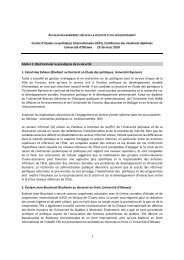Full text - Faculty of Social Sciences - Université d'Ottawa
Full text - Faculty of Social Sciences - Université d'Ottawa
Full text - Faculty of Social Sciences - Université d'Ottawa
Create successful ePaper yourself
Turn your PDF publications into a flip-book with our unique Google optimized e-Paper software.
78 IPC Review 3 Blueprint for Effective Crime Prevention in Canada 79<br />
have identified such programs through meta-analyses <strong>of</strong> evaluation studies <strong>of</strong><br />
their effectiveness. For example, for children below the age <strong>of</strong> 12, Stop Now<br />
and Plan (SNAP) or the Boys and Girls Clubs’ mentoring programs have been<br />
recognized as model programs. For adolescents, Multisystemic Therapy (MST)<br />
and Fast Track are examples <strong>of</strong> promising interventions. And for young adults,<br />
Quantum Opportunities is an example <strong>of</strong> a promising intervention. On the<br />
basis <strong>of</strong> an analysis <strong>of</strong> the existing scientific literature, and considering the<br />
Canadian con<strong>text</strong>, the NCPC has decided to give priority to funding twelve<br />
model or promising programs that target these groups and address known risk<br />
factors associated with crime and <strong>of</strong>fending.<br />
This said, very few <strong>of</strong> these interventions have been rigorously tested in<br />
Canada, so their impacts are not well known. Furthermore, evaluation studies<br />
have not always identified the key elements <strong>of</strong> the processes that make these<br />
programs work. For example, more needs to be learned about the specific<br />
characteristics <strong>of</strong> successful interventions (con<strong>text</strong>, duration, intensity) or<br />
the type <strong>of</strong> pr<strong>of</strong>essionals or organizations required to deliver them and, in<br />
particular, what and when to adapt them to best respond to the needs and<br />
priorities <strong>of</strong> local communities.<br />
Having adopted a strong focus on demonstrable results, and being very<br />
conscious <strong>of</strong> the need to build longer-term sustainability for the most effective<br />
programs, the NCPC has built an internal evaluation capacity to oversee<br />
multi-site evaluation studies <strong>of</strong> the priority model and promising projects.<br />
These evaluation studies, using the most rigorous available designs (whenever<br />
possible a quasi-experimental design with comparable control group and<br />
longitudinal follow-up <strong>of</strong> the clients) will aim to measure the effectiveness<br />
(impacts) and cost-effectiveness (in selected cases) <strong>of</strong> these interventions. Once<br />
effectiveness has been well established and more is known about “the how”,<br />
the NCPC will work with its partners to identify appropriate ways to ensure<br />
that these interventions are sustained.<br />
A good policy translates into concrete and effective action, so bridging<br />
the “implementation gap” is possibly the most challenging task in crime<br />
prevention. Adopting an evidence-based strategy presents many challenges<br />
for communities and practitioners: the knowledge base may not be accessible<br />
to them and they may not have the tools or experience to implement model<br />
and promising programs; they must also overcome the traditional resistance<br />
to adopting models that do not have local roots. As such, active knowledge<br />
transfer and dissemination <strong>of</strong> practical knowledge on effective crime prevention<br />
practices are fundamental elements <strong>of</strong> the NCPC’s focus and activities.<br />
More specifically, the NCPC conducts a series <strong>of</strong> activities designed to promote,<br />
disseminate and foster the successful use <strong>of</strong> the knowledge base <strong>of</strong> effective<br />
practices. The NCPC will continue to build its knowledge base, from research<br />
reports reviewing the knowledge in a given domain, to fact sheets on evaluated<br />
programs designed to inspire practice. But publications, whether physical or<br />
electronic, can only go so far in helping to build the capacity <strong>of</strong> practitioners<br />
and communities. In response, the NCPC also organizes a series <strong>of</strong> interactive<br />
knowledge transfer and dissemination activities aimed at its own program<br />
managers (who work directly with communities), its provincial and territorial<br />
partners, and community-based organizations.<br />
The implementation <strong>of</strong> the NCPS rests in particular on funding purposefully<br />
selected promising and model programs in multiple sites, and the NCPC<br />
is keenly aware that practitioners require information and support. So the<br />
NCPC: makes available detailed information to funding recipients on these<br />
promising and model programs (implementation fact sheets); organizes very<br />
focused training sessions steered by a duo composed <strong>of</strong> a developer and a<br />
deliverer <strong>of</strong> a given promising or model program; ensures that the funding<br />
agreement includes a provision for in-depth training and continuous followup<br />
<strong>of</strong> the service providers; orchestrates communities <strong>of</strong> practice both for<br />
program managers within the Centre, and for recipient organizations in order<br />
to ensure that practitioners in various parts <strong>of</strong> the country benefit from the<br />
experience <strong>of</strong> others; and schedules yearly knowledge to practice seminars on<br />
specific issues such as youth gangs, evaluation in Aboriginal communities, and<br />
youth at-risk.<br />
In conclusion, the NCPC remains committed to continuing to play an active<br />
and collaborative role in the development and implementation <strong>of</strong> a national<br />
crime prevention strategy for Canada, and to continuing to work in partnership<br />
with the Provinces and Territories, municipal orders <strong>of</strong> government, and with<br />
communities and organizations interested in contributing to the goal <strong>of</strong> a safer<br />
and more secure Canada. The National Crime Prevention Strategy (NCPS)<br />
is attempting to address the challenges and difficulties described by Homel<br />
and Solomon in a number <strong>of</strong> ways including the development <strong>of</strong> effective<br />
crime prevention policies, a commitment to evidence-based practices, selective<br />
interventions, a focus on evaluation, and by achieving strategic partnerships<br />
and local collaboration to deliver good and sustainable crime prevention.
















